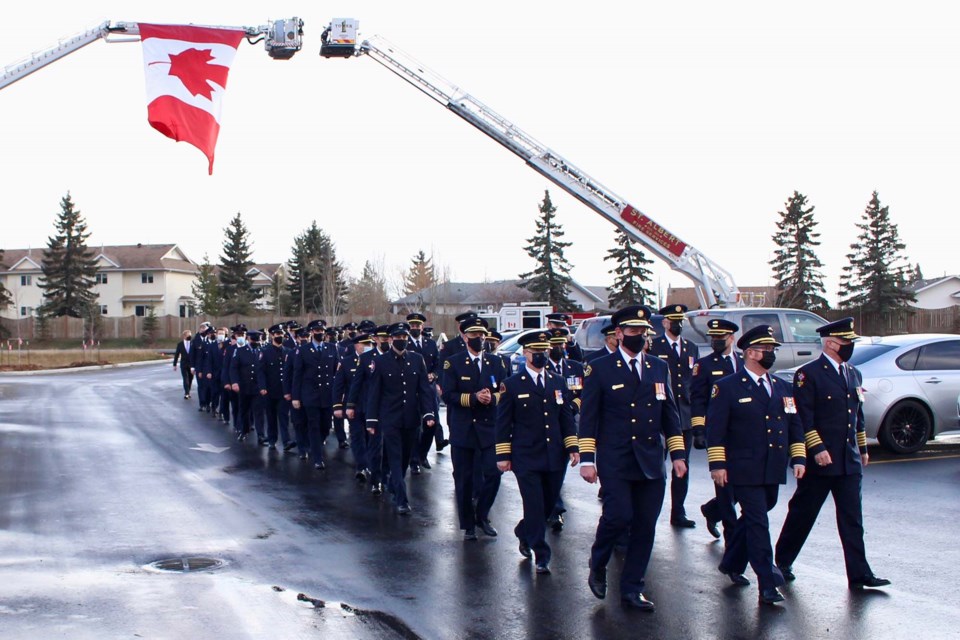St. Albert fire services members are determined to make changes to improve mental-health supports after the loss of one of a member last week.
Greg Harvey, president of St. Albert Fire Services Local 2130 said the loss of member Warren Hillier to mental illness has highlighted the need for change in the department.
“I think this is a catalyst for sure and we are going to work extremely hard to get more mental-health support for our membership, [including having something like] one psychological assessment a year done for everybody,” Harvey said.
Currently at the fire department there is a peer support team, made up of around a dozen firefighters who are trained to connect with those who are struggling with resources. The department also works with a clinician who is aware of the unique challenges first responders face.
But Harvey said more supports are needed to help first responders deal with the challenges of the job.
Through the pandemic, calls for service of emergency responders has increased, Harvey said, and that work environment is really taking a toll on emergency responders.
“We’re just dealing with the pandemic and the opioid crisis — just a shortage of staff everywhere related to it. It's really starting to take a toll on the membership,” Harvey said.
“You see it in the eyes, you can see it in people, how they are portraying themselves. It has just been a really long stretch in emergency services.”
Paramedics are responding to more calls than they ever have before, and doing more cross-city coverage than in the past. Many staff are working past the end of their shifts more than they have before, preventing them from getting home to their families at a reasonable time because they are stuck working overtime.
The City of St. Albert didn't have an expert available for an interview, but city spokesperson Cory Sinclair said in an email the city has had an average of 10 employees out of the 130 fire service members out on occupational and non-occupational long-term absences over the past three years. This is around 7.7 per cent of staff off at any time.
Many of those who are reaching out might not have access to the resources available to help them, Harvey said.
Firefighters often fear going to a psychologist because they don’t want to get a post-traumatic stress disorder diagnosis, as it may have a huge impact on their career. If a first responder is diagnosed with PTSD, they are referred to Workers Compensation Benefits (WCB) and will likely miss work.
For many, the diagnosis will impact their personal life and potential to come back to a job they love.
“People have lives to live, they have finances and bills to pay, and all that sort of thing and it doesn't make it easy to get treatment while still trying to do that,” Harvey said, adding members of the fire services are currently suffering silently, afraid to get the PTSD diagnosis and miss work.
The firefighters who don’t get a PTSD diagnosis and don’t go through WCB only have coverage for three visits to a psychologist annually.
By the time the psychologist can figure out what the problem is, Harvey said, that leaves time for one treatment session and the member is left paying out-of-pocket for help. The union president said in the future they will try to improve their benefits to include more mental-health coverage for workers.
Harvey said fire services should take the same approach with mental-health issues that they take for physical illnesses. They do blood tests and screen for cancer annually, and Harvey wants to see that attitude with mental health, and include annual screening for mental illness.
“There's nothing in place that would say you will get a psychological test to make sure that your head is healthy, which is just as much of a risk in emergency services nowadays,” Harvey said.
Stigma plays a large part in seeking help, too, said Harvey. There is some stigma about going to a psychologist and getting a PTSD diagnosis.
Things have changed in the 17 years he has been a firefighter, Harvey said, and in the past it was considered a weakness to even say a call bothered a first responder.
Now first responders are more open with their struggles. The night of Hillier’s funeral, many emergency responders gathered together to share stories about their bad calls and how they used their support networks for help when they needed it.
Part of what helps first responders open up is the bravery of those who are willing to speak out, like Hillier’s wife Michele, who is open and candid about what happened with her husband and who wants to use the tragedy in her life to help support first responders and families who are struggling.
“Michele is a very, very strong person who is going to make sure that we make sure that this is the catalyst to improve mental-health supports.”




